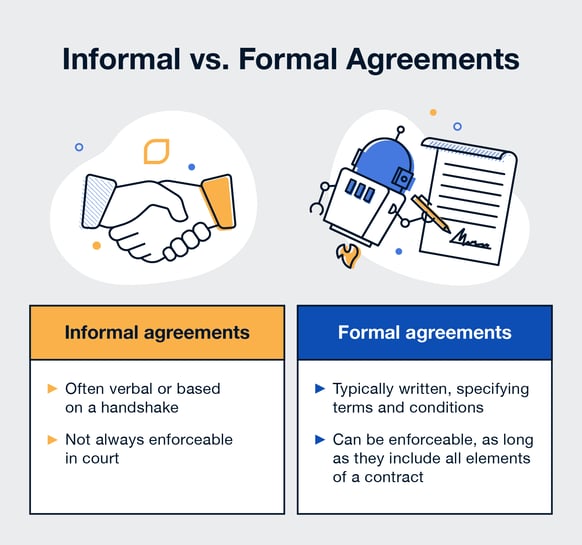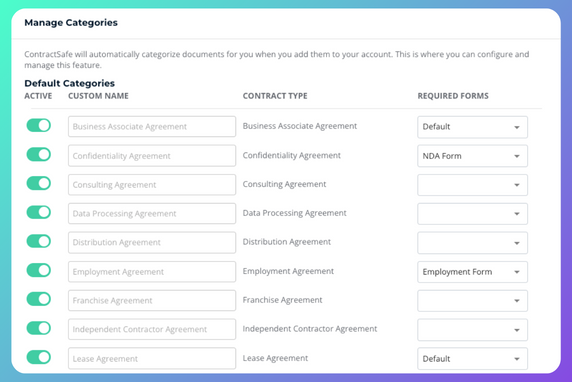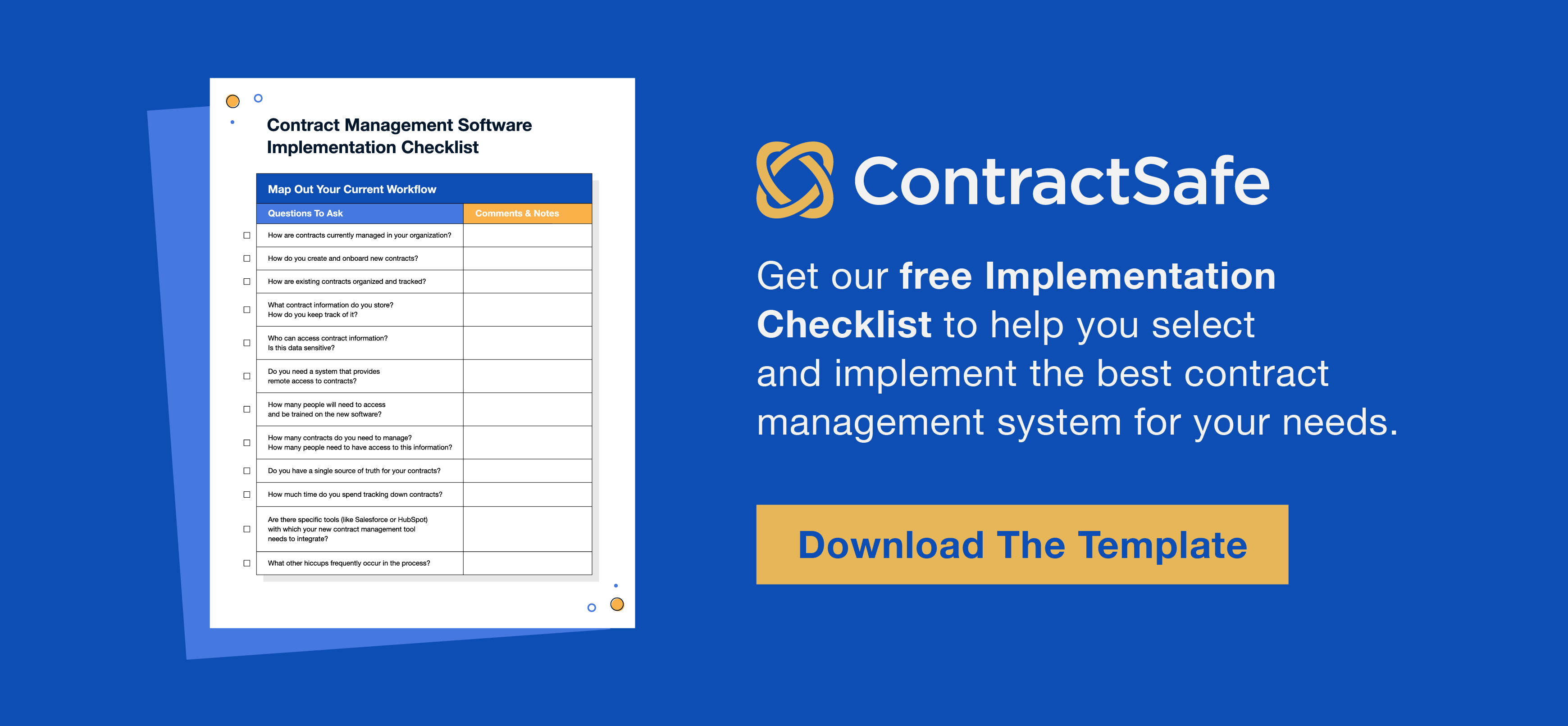Agreements and contracts are often used interchangeably, but there are key differences between the two.
An agreement is a broad term that refers to any understanding between two or more parties. A contract, on the other hand, is a legally binding agreement that creates enforceable obligations.
In this article, we will explore the differences between agreements and contracts, and we’ll show you how to use contract management software to manage all of your deals effectively.
Table of Contents
- What Is a Contract?
- What Is an Agreement?
- Why the Distinction Matters
- When To Use an Agreement vs. Contract
- How To Turn an Agreement Into a Contract
- Most Important Features to Manage Contracts and Agreements
- Contract vs. Agreement FAQ
- Ready To Take Your Contract Management to the Next Level?
What Is a Contract?
A contract is a legally binding agreement between two or more parties that creates mutual obligations enforceable by law.
To be considered valid, a contract must include six key elements:

- Offer: A clear proposal by one party to another, outlining specific terms and conditions
- Acceptance: An unequivocal agreement to the offer's terms
- Awareness: An understanding of the terms and conditions
- Consideration: Something of value exchanged between the parties, such as money, goods, services, or promises to act (or refrain from acting) in a certain way
- Capacity: The legal capacity of all parties involved to authorize a deal on behalf of the company
- Legality: The purpose of the contract must be lawful — a contract cannot be formed with the intention to carry out an illegal act
Having a clear understanding of these elements is essential, as they form the foundation of a legally enforceable contract.
Now, let's explore the concept of agreements and how they differ from contracts.
What Is an Agreement?
An agreement represents a mutual understanding between two or more parties. It signifies that everyone involved is on the same page about a particular matter or intended course of action.
Unlike contracts, agreements may not always be legally binding.
In fact, they exist on a spectrum of formality.

Informal agreements are often verbal or based on a handshake, outlining a simple understanding. This could be something like agreeing to consider working with another company in the future or scheduling a demo for a new SaaS tool.
While not always enforceable in court, informal agreements can still be important for building trust and fostering cooperation.
Formal agreements, on the other hand, are usually written documents that specify specific terms and conditions of the understanding.
They often serve a range of purposes beyond simply guaranteeing legal enforceability.
Here are some examples:
- Non-disclosure agreements (NDAs) safeguard sensitive information shared during discussions or collaborations. Since they involve confidentiality, NDAs are typically structured as legally binding contracts.
- Letters of intent (LOIs): LOIs express initial commitments in a negotiation and are often used prior to drafting a more formal contract. The legal enforceability of an LOI depends heavily on how it's written — some are intended to bind parties, while others are not.
- Memorandums of understanding (MOUs): MOUs are used between organizations to outline the basis for collaboration. Typically, they aren't intended to be legally enforceable contracts but instead formalize a cooperative spirit between the parties.
Understanding the nuances between agreements and contracts is crucial, as the legal implications can be significant. Let's explore why this distinction matters.
Why the Distinction Matters
Understanding the difference between agreements and contracts is vital because it directly impacts the level of legal protection and the remedies available if something goes wrong.
Here’s why:
- Enforceability: The key distinction lies in enforceability. Contracts are designed to be legally binding. If one party breaks the agreement, the other can seek legal action for damages or force the other party to uphold their end of the bargain. Agreements, especially informal ones, are often harder to enforce in court. This leaves parties vulnerable if the other side fails to follow through.
- Risk management: Businesses and individuals enter agreements and contracts daily. Not understanding the difference could lead to costly disputes, financial losses, and damaged relationships. Clarifying whether a situation calls for an agreement or a contract allows you to make informed decisions and safeguard your interests.
- Clarity and protection: Putting agreements in writing, even if they're not full-fledged contracts, adds a layer of clarity. It reduces misunderstandings about the terms involved. When a formal contract is necessary, having the right elements in place ensures maximum protection under the law.
Now, let’s take a look at a couple of examples to help clarify the distinction.
Scenario 1
Lisa hires The Painter Boys, a painting company, to paint her house. Lisa and Mike (the president of The Painter Boys) sign a written general services agreement, which outlines the type of paint to be used, the price to be paid, and when the job will be completed. Lisa pays The Painter Boys $1,000. No one shows up on the scheduled date, and for the last two weeks, no one from The Painter Boys will return Lisa’s calls. What now?
Lisa has a valid contract with The Painter Boys, which is legally enforceable. She can file a lawsuit in court to recover damages.
Scenario 2
Lisa needs her house painted. She finds an ad on the internet for The Painter Boys house painting business, in which the company promises top-quality service for the lowest price in town. Lisa is impressed and calls The Painter Boys. Mike, the president, agrees to visit Lisa’s house the following Tuesday at 11 a.m. to inspect the house, speak with Lisa, and provide a bid. To keep this appointment, Lisa cancels her own business appointment, which causes her to lose $100 in profits.
Mike doesn’t show up on Tuesday. When Lisa calls, Mike apologizes and admits that he had to “skip” the appointment. He had forgotten that he needed to take his dog to the groomer. When asked why he didn’t call, he said he figured Lisa wouldn’t wait around anyway. He offers to make a new appointment for Thursday at 2 p.m. What now?
With regard to Lisa’s lost profits, she is out of luck. She and Mike had an agreement to have a meeting, but the parties had not yet entered into any type of enforceable contract.
With these considerations in mind, let's explore when an agreement might be appropriate and when a formal contract is essential.
When To Use an Agreement vs. Contract
Choosing between an agreement and a contract requires careful consideration of the situation at hand. The key is to assess the level of risk and the potential consequences if things don't go according to plan.
Agreements are appropriate for:
- Low-risk scenarios: When the stakes are relatively low and you're dealing with matters that are unlikely to result in serious disputes.
- Relationships based on trust: If you have an established relationship with the other party and there's a strong foundation of trust.
- Initial stages of negotiation: Agreements can be useful for outlining preliminary terms and intentions before drafting a formal contract.
Contracts are essential for:
- Situations involving significant money: Whenever substantial financial sums are involved, a contract provides clarity and legal recourse.
- Complex deals: Contracts help define specific terms and obligations within complex transactions or multi-step arrangements.
- Legal protection: A contract is vital when you need the assurance of legal enforceability should a dispute or breach occur.
Next, we’ll dive into the process of transforming an agreement into a contract, ensuring you have the necessary elements in place to safeguard your interests.

How To Turn an Agreement Into a Contract
Sometimes, an agreement may evolve into a situation where you need the legal protection of a formal contract.
To make this transition, you must ensure that all the essential elements of a contract are present and clearly documented.
- Make sure the offer's terms are specific and that the acceptance is unequivocal.
- Clearly outline what each party is bringing to the table (goods, services, money, etc.) as a consideration for their participation in the contract.
- Verify that all parties involved have the legal capacity to enter into a contract.
- Ensure the purpose of the agreement is lawful.
In complex situations or when dealing with high-value transactions, it's always best to get your legal department involved. Your legal team can draft a contract that accurately reflects your agreement, protects your interests, and complies with relevant laws.
Most Important Features to Manage Contracts and Agreements
Organizing contracts and agreements is crucial for business success. And the best contract management software can help.
ContractSafe offers a centralized, user-friendly solution for streamlined management.
Centralized Repository
Say goodbye to scattered documents and frustrating searches through old emails or files.
With ContractSafe’s cloud-based contract repository, you can access your documents safely from any device, ensuring the information you need is always at your fingertips.
ContractSafe automatically tracks updates and maintains a full audit trail, so you're always working with the latest version and have full visibility into who made changes and when.
To streamline your workload even further, ContractSafe’s [AI]ssistant tirelessly analyzes your contracts, extracting key data and organizing and categorizing them for easy retrieval.

Tracking and Reporting
ContractSafe gives you full visibility into the lifecycle of your agreements and contracts.
Easily track their status and stay on top of critical deadlines.
Plus, customizable dashboards can provide tailored insights, showing you only the information relevant to your role and responsibilities.
Need to locate a specific contract quickly?
ContractSafe's powerful search feature, powered by optical character recognition (OCR) technology, allows you to search even within scanned images or PDF files.
Additionally, you can generate comprehensive reports on contract performance, empowering you with the data you need to make informed business decisions.
Alerts and Reminders
ContractSafe acts as your vigilant assistant, ensuring you never miss critical deadlines, expirations, or renewal dates.
- Receive automated notifications tailored to your needs, providing ample time to take action and avoid costly surprises.
- Keep all stakeholders informed by scheduling email reminders, even for those outside your organization.
- Effortlessly manage auto-renewing contracts and make informed decisions.
ContractSafe's flexible sorting options allow you to organize dates by vendor, department, manager, or any custom criteria, adapting to your specific workflow.
Best of all, it’s easy to implement!
Contract vs. Agreement FAQ
Let's clarify some of the most frequently asked questions about agreements and contracts.
Can an Email Exchange Be Considered a Contract?
Yes, an email exchange can form a legally binding contract if it contains all the essential elements (offer, acceptance, awareness, consideration, capacity, and legality). It is important, however, to be very clear and specific in your email communication to avoid potential misunderstandings.
Is an Agreement Legally Binding?
An agreement may or may not be legally binding. Informal agreements often lack enforceability, while formal agreements with the necessary elements of a contract can stand on their own as legally binding documents. Whether a specific agreement has legal standing depends on its content and the intent of the parties involved.
Is Signing an Agreement the Same as a Contract?
Not always. While signing often signals a serious commitment, an agreement can be binding even without signatures if the necessary elements of a contract are present. A signed agreement is generally easier to enforce in court.
Who Cannot Enter Into a Contract?
Generally, there are two main categories of people who cannot enter into a contract: minors (those under the legal age of adulthood) and individuals deemed mentally incompetent. Laws regarding these specifics can vary by jurisdiction.
Ready To Take Your Contract Management to the Next Level?
If you are like most people in business, you’re dealing with contracts every year numbering in the dozens, hundreds, or even thousands.
If you need a powerful yet easy-to-use contract management tool, ContractSafe can help.
With the use of OCR and other innovative technologies, ContractSafe provides a secure, affordable contract management solution.
You can quickly upload all contracts and agreements, perform Google-type searches, track important contract dates, store contract templates, and enjoy life.
Best of all, it’s all a breeze to implement. Why not check out a demo today?



















